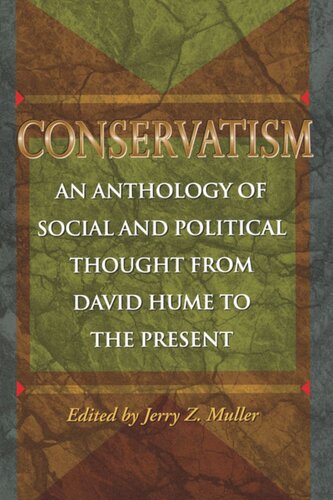

Most ebook files are in PDF format, so you can easily read them using various software such as Foxit Reader or directly on the Google Chrome browser.
Some ebook files are released by publishers in other formats such as .awz, .mobi, .epub, .fb2, etc. You may need to install specific software to read these formats on mobile/PC, such as Calibre.
Please read the tutorial at this link: https://ebookbell.com/faq
We offer FREE conversion to the popular formats you request; however, this may take some time. Therefore, right after payment, please email us, and we will try to provide the service as quickly as possible.
For some exceptional file formats or broken links (if any), please refrain from opening any disputes. Instead, email us first, and we will try to assist within a maximum of 6 hours.
EbookBell Team

0.0
0 reviewsAt a time when the label "conservative" is indiscriminately applied to fundamentalists, populists, libertarians, fascists, and the advocates of one or another orthodoxy, this volume offers a nuanced and historically informed presentation of what is distinctive about conservative social and political thought. It is an anthology with an argument, locating the origins of modern conservatism within the Enlightenment and distinguishing between conservatism and orthodoxy. Bringing together important specimens of European and American conservative social and political analysis from the mid-eighteenth century through our own day, Conservatism demonstrates that while the particular institutions that conservatives have sought to conserve have varied, there are characteristic features of conservative argument that recur over time and across national borders.
The book proceeds chronologically through the following sections: Enlightenment Conservatism (David Hume, Edmund Burke, and Justus Möser), The Critique of Revolution (Burke, Louis de Bonald, Joseph de Maistre, James Madison, and Rufus Choate), Authority (Matthew Arnold, James Fitzjames Stephen), Inequality (W. H. Mallock, Joseph A. Schumpeter), The Critique of Good Intentions (William Graham Sumner), War (T. E. Hulme), Democracy (Carl Schmitt, Schumpeter), The Limits of Rationalism (Winston Churchill, Michael Oakeshott, Friedrich Hayek, Edward Banfield), The Critique of Social and Cultural Emancipation (Irving Kristol, Peter Berger and Richard John Neuhaus, Hermann Lübbe), and Between Social Science and Cultural Criticism (Arnold Gehlen, Philip Rieff). The book contains an afterword on recurrent tensions and dilemmas of conservative thought.